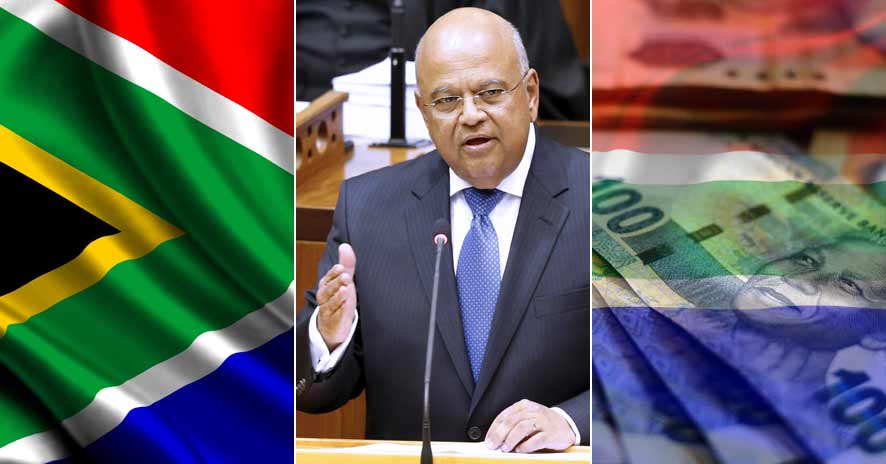
The ‘highlight ‘of Finance Minister Pravin Gordhan’s budget speech in the national assembly on Wednesday the 22nd of February 2017 was the introduction of a new tax bracket for the very rich. The general message was that “tough choices have to be made to achieve development outcomes”.
The budget speech promised greater distribution of wealth to the poor. However, the general feeling is that there is no guarantee that the tax burden Gordhan plans to place on the very rich will help deliver the sustainable returns Gordhan needs to fund the growing gap between shrinking revenues and growing expenditure.
Total tax increases of R28bn are required to fill this hole in government finances.
Tax proposals will raise R28 Billion #Budget2017
— Parliament of RSA (@ParliamentofRSA) February 22, 2017
Tax increases needed to fill the gap
If you earn more than R1.5 million a year and are eligible to pay tax in South Africa, you will now be paying 45% tax. Previously the rate was 41%. It is expected this increase will raise R4.4bn.
A fuel levy rise of 30 cents per litre and an increase in ‘sin taxes’ on alcohol and tobacco will raise an additional R16.5 billion. R6.8bn will be collected through a higher dividend withholding tax rate – which will increase from 15% to 20%
No change to economic growth forecasts
The economic growth forecasts provided by the Treasury in the medium-term budget policy statement in October 2016 remain unchanged.
On a positive noted there has been an inflationary increase to the grant for the elderly and disabled from R 1525 to R1620 a month and smaller grants made to other categories. There has been an increase made in the threshold for the payment of transfer duty if you’re purchasing a home – from R750 000 to
R 900 000 – and the annual allowance for tax-free saving accounts will increase to R33 000.
Government expenditure over the next three years will include:
- R490bn (R457bn last year) on social grants.
- R106bn (R93.1bn) on transfers to universities, while the National Student Financial Aid Scheme will spend R54.3bn (R41.2bn).
- 9bn (R707.4bn) on basic education, including R48.3bn for subsidies to schools, R42.9bn for infrastructure, and R12.7bn (R14.9bn) for learner and teacher support materials.
- R114bn (R108.3bn) for subsidised public housing.
- 4bn (R102bn) on water resources and bulk infrastructure.
- R189bn (R171.3bn) on transfers of the local government equitable share to provide basic services to poor households.
- 6bn to support affordable public transport.
- R606bn on health, with R59.5bn on the HIV/Aids conditional grant.
Transformation is the name of the game
Gordhan delivered a strong transformation message throughout the budget speech. He said that “Without transformation, growth will reinforce inequality and without growth, transformation will be distorted by patronage”.
If we make the right choices and do right things we will achieve a just and fair society founded on human dignity and equality #Budget2017
— Parliament of RSA (@ParliamentofRSA) February 22, 2017
If you’re a South African residing abroad and need any information about how the new 2017 budget affects you or you need advice about your financial migration, contact us today and we’ll help you on the path to financial freedom in your new home.
[contact-form-7 id=”6581″ title=”Blog post (call me)”]
what influence did the budget had on South African Expats that Lives abroad and who’s income was deemed to be expat income and not taxed in SA – and they lived abroad and only visit SA on Holiday
Please advise
Hi Reginald,
Please send us your contact details and one of our financial consultants will contact you back : https://www.cashkows.com/contact-us/
I am a non resident,but SA passport holder working in the Abu Dhabi,UAE, have been for 5 years plus, left SA in 2007.
I hold a resident visa with the UAE.
Lots of rumors going around regarding new tax proposals by SARS regarding people working in the UAE.
Will I be affected, as I spend less than 40 days a year in SA for the last 5 years.
I am registered with SARS as non resident for tax purposes.
Hi Kobus,
Please send us your contact details and one of our financial consultants will contact you back : https://www.cashkows.com/contact-us/
Good day,
I am an expat working full time in Dubai with no tax obligations in RSA. Where do I stand un regards to paying tax?
Hi Mignon,
You are more than welcome to submit your details and one of our financial consultants will contact you back : https://www.cashkows.com/please-call-me/